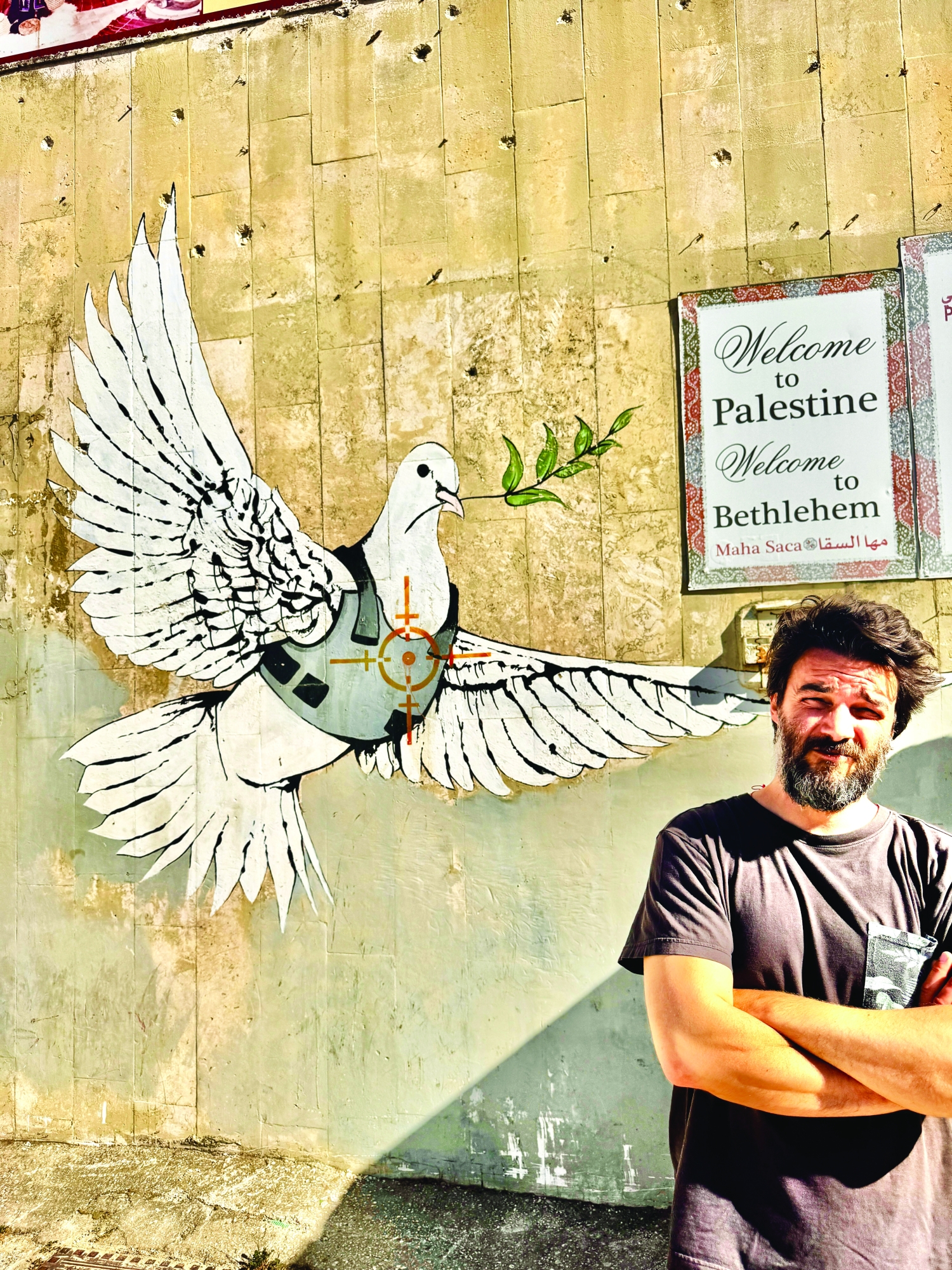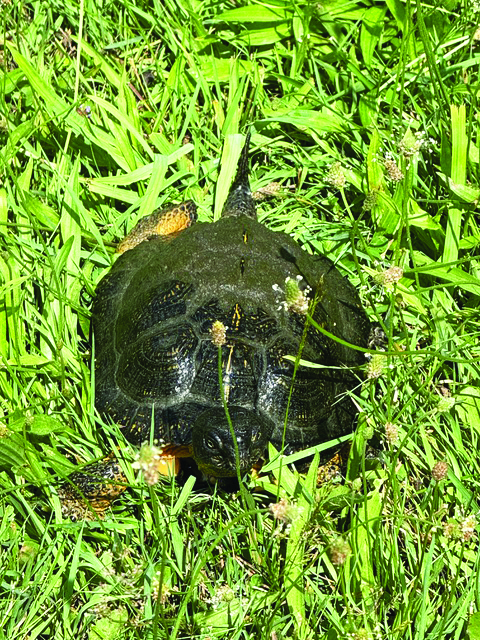The Great Denial: Genocide in Real Time
Photo: Northern Michigan musician and activist Seth Bernard in late May in Bethlehem in the Palestinian West Bank.
By Timothy Young
Op-ed contributor
 From 50 miles away Israel’s air defense system sounds like fireworks coming from the next town over. After more than 30 years of volunteering in conflict zones, such ordnance wouldn’t normally raise concerns for my own safety, however, the Houhtis in Yemen were targeting the Airport in Tel Aviv where I had a departing flight scheduled in the morning. As I chatted with George, my favorite Arab shop keeper a mere 10 feet away from the Church of the Nativity in Bethlehem, he assured me, “Don’t worry. No one bombs Jesus here.” We chuckled as we sipped his offering of tea. It was that nervous sort of chuckle to mask, for a few brief seconds, the tragedy unfolding all around us.
From 50 miles away Israel’s air defense system sounds like fireworks coming from the next town over. After more than 30 years of volunteering in conflict zones, such ordnance wouldn’t normally raise concerns for my own safety, however, the Houhtis in Yemen were targeting the Airport in Tel Aviv where I had a departing flight scheduled in the morning. As I chatted with George, my favorite Arab shop keeper a mere 10 feet away from the Church of the Nativity in Bethlehem, he assured me, “Don’t worry. No one bombs Jesus here.” We chuckled as we sipped his offering of tea. It was that nervous sort of chuckle to mask, for a few brief seconds, the tragedy unfolding all around us.
The next morning my friend Seth Bernard and I jump in Mohamad’s taxi and head to the airport. Mohamad is in my digital rolodex and I use him every time I’m in the Holy Land. He’s Palestinian Arab with Israeli citizenship. The benefits of such a status includes the right color license plate, allowing him use of Israeli only roads, fast track through security checkpoints, and access to the West Bank and Gaza. It’s good to have a Mohamad in these parts. He may not realize it, but he’s become quite the tour guide, having honed his craft shuttling journalists from Fox, Al Jazeera and CNN all around Israel and Palestine. Thus, he didn’t neglect to point out the crater in the airport parking lot from the previous night’s Houthi missile. All flights were back on schedule, he assured us. Right. Moments later, as we were waiting in line for security, there were more incoming. As air raid sirens sounded off, hundreds of us were hustled into a bomb shelter. We later emerged to find that our flight was canceled. The pickings were slim, but we grabbed the last couple of seats on a flight to Tblisi, Georgia, where we could get an overnight van ride through the Caucusus Mountains back to Yerevan, Armenia to complete our journey. Little did we know that we had threaded the needle until a few days later when Israel would preemptively attack Iran and the Tel Aviv airport would be shut down for over a week.
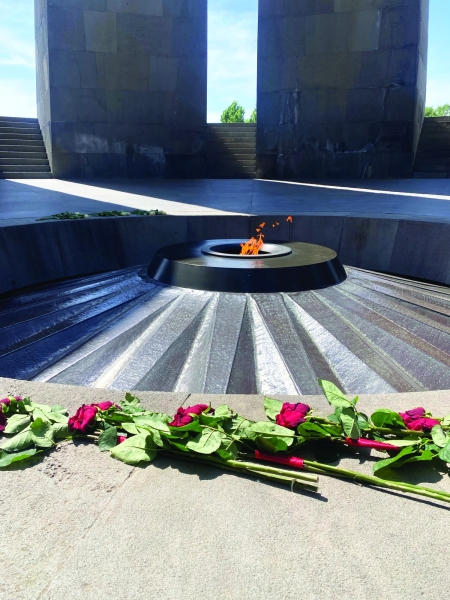
Armenian Genocide Memorial in Yerevan
Seth is of Armenian heritage and this trip was in part a chance for him to connect with both the place and the generational trauma that comes withbeing Armenian. Palestine/Israel was a side trip to attend the wedding of our mutual friend, Ayed. That leg of the trip found me sitting in the West Bank of Palestine on the 600th day since Hamas slaughtered over a thousand innocent Israelis, followed by the slaughter of tens of thousands of innocent Palestinians.
While a short car ride away, the ripple effect of the conflict in Gaza was palpable. Reconciling the profound changes from previous visits proved difficult. Gone were the tourists and religious pilgrims that would normally be packing the narrow cobblestone streets or waiting in line for hours for a chance to experience all the iconic Christian sites that Bethlehem has on offer. Desperation hung in the air and emanated from eyes of shopkeepers and taxi drivers. Once proud proprietors of thriving businesses, now urgently encouraged you to enter their dusty shops where the inventories of local crafts look dusty, tired, and convey desperation while they shopkeepers drop their shoulders in humiliation and beg for money should a transaction not take place. And all this stood in contrast to the joy I experienced with Palestinians attending the wedding of our friend Ayed. As always in conflict, people display the most incredible resiliency to carry on, to love, to mourn, to care for one’s children, to survive. Despite Ayed’s briefing that his wedding would be a subdued affair since “This is not a time for celebration” his guests were not on the same page. It quickly evolved into an evening of singing, dancing and raucous celebrations. Like that little chuckle with George the shopkeeper, we find those little bits of respite during dark times. Even in the face of genocide.
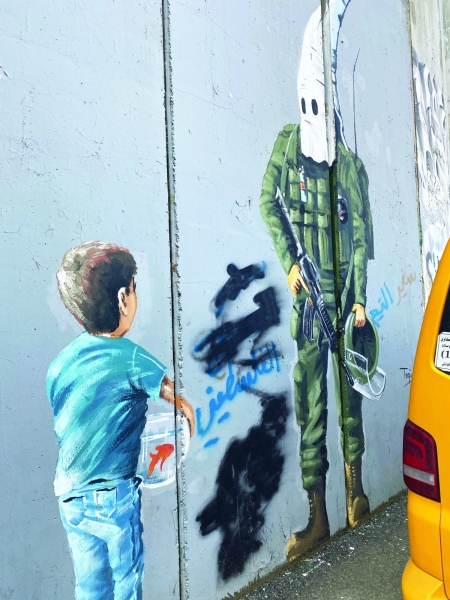 “Genocide” is most commonly invoked in the past tense, used to describe an historical event. While genocides are underway they are often overshadowed by the larger context of war and can go unrecognized in the day to day, a civilian bombing here, a displacement there. Then there are refugee migrations, and forced famine. Most often it is from the safety of hindsight that a genocide be universally accepted as such and join the history books along side those of Armenia, Rwanda, Darfur, Cambodia, Germany and Srebrenica, to name just a few from recent history. Because in the past, due to the limits of gathering and disseminating information, many indicators of genocide of the past went unnoticed, , the momentum of the killing would outpace the ability of society to identify a genocide and respond. Yet today we are watching in real time as it’s horrors unfold in Gaza. This is new terrain.
“Genocide” is most commonly invoked in the past tense, used to describe an historical event. While genocides are underway they are often overshadowed by the larger context of war and can go unrecognized in the day to day, a civilian bombing here, a displacement there. Then there are refugee migrations, and forced famine. Most often it is from the safety of hindsight that a genocide be universally accepted as such and join the history books along side those of Armenia, Rwanda, Darfur, Cambodia, Germany and Srebrenica, to name just a few from recent history. Because in the past, due to the limits of gathering and disseminating information, many indicators of genocide of the past went unnoticed, , the momentum of the killing would outpace the ability of society to identify a genocide and respond. Yet today we are watching in real time as it’s horrors unfold in Gaza. This is new terrain.
Even without the declaration of genocide by Human Rights Watch, Amnesty International, International Court of Justice and the United Nations, it’s difficult to deny that this worst of atrocities is taking place in Gaza. From the moment Israeli Defense Minister, Yoav Gallant said, “We are laying complete siege on Gaza. No electricity. No food. No water. No fuel. Everything is closed. We are fighting human animals,” we’ve been watching his commanders executing that strategy on a daily basis. As we witness atrocities and suffering coming at us in real time, there’s a surge in narratives of denial and no shortage in justifications. “Israel has a right to defend itself” or “Hamas are terrorists” are common tropes used by many, despite that most genocide takes place during times of war and the perceived righteousness of the war has no bearing on whether the facts on the ground constitute genocide.
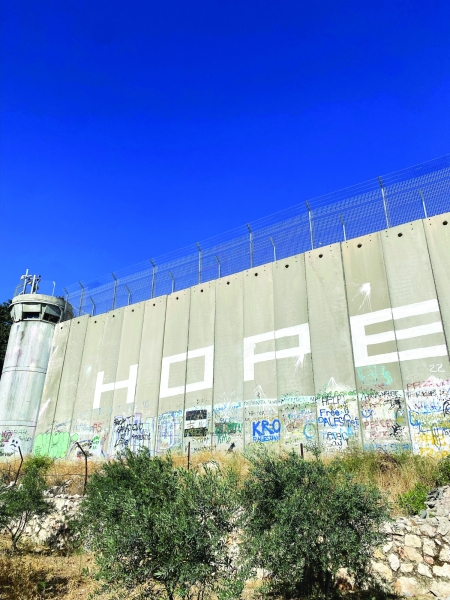 Regardless of whether or when history comes to some consensus on labeling this genocide, I’ve come to realize that, in the heat of the moment, and to varying degrees, some of us simply need to see the world in the dichotomy: black/white, right/wrong, left/right, good/bad and take sides in all things. To do that, one must suspend the pursuit of truth at times. It can appear as naive, callous, or intellectually lazy to simply distill it down to what happened on October 7, 2023, devoid of any historical context of why Hamas exists and what truly motivates them to act. Yet, I see this communal response more as a strategy of collective denial based in human nature. Collective denial is an emotional lifeline that simplifies the world, allowing us to get on with our own lives and challenges, giving ourselves and world leaders a path to complacent practicality.
Regardless of whether or when history comes to some consensus on labeling this genocide, I’ve come to realize that, in the heat of the moment, and to varying degrees, some of us simply need to see the world in the dichotomy: black/white, right/wrong, left/right, good/bad and take sides in all things. To do that, one must suspend the pursuit of truth at times. It can appear as naive, callous, or intellectually lazy to simply distill it down to what happened on October 7, 2023, devoid of any historical context of why Hamas exists and what truly motivates them to act. Yet, I see this communal response more as a strategy of collective denial based in human nature. Collective denial is an emotional lifeline that simplifies the world, allowing us to get on with our own lives and challenges, giving ourselves and world leaders a path to complacent practicality.
We all have differing capacities when it comes to the emotional resiliency, or the will to live within, and seek the truth, especially when that requires confronting the starvation and slaughter of tens of thousands of innocent civilians. I doubt any of us are immune to this human need to find refuge in clinging to narratives, of the oppressor or liberator, and regurgitating soundbites that bring comfort and simplify very complicated topics.
Genocide permeated our thoughts and conversations on this trip. From sitting on the shores of the Rhine River in Germany during a layover, to bearing witness to Seth’s emotional catharsis and tears at the genocide memorial in Armenia, I came to more deeply understand the power of generational trauma. I can only imagine how the Jews of Israel and the world must struggle with their own trauma only a generation behind them. It’s hard to imagine they wouldn’t seek refuge in a collective denial and resist the thought that they could be the oppressor; the hurt people that are hurting people.
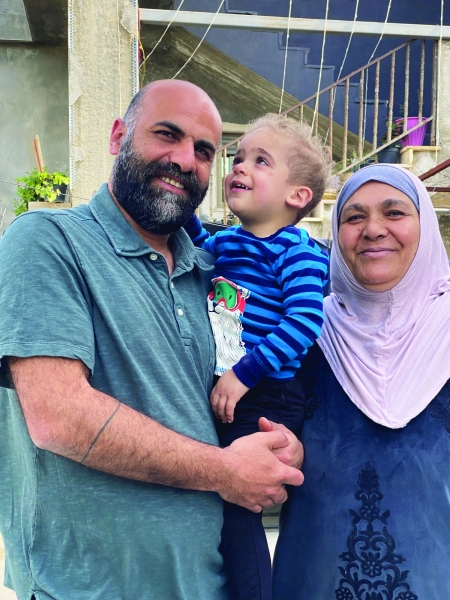 Yet those denial narratives offer many conscientious insulation, allowing us to neatly cling to the good/evil, right/wrong dichotomy we are fed, and at times need, so we don’t have to confront the full truth that is always somewhere in the middle. At times it’s simply easier to view the universe through a pinhole than through the broad aperture that truth demands of us. This is where atrocity thrives and world leaders hide. And unfortunately for Palestinians and Israelis, as long as we are debating whether or not genocide is taking place, we are collectively freed from the conscientious imperative to act.
Yet those denial narratives offer many conscientious insulation, allowing us to neatly cling to the good/evil, right/wrong dichotomy we are fed, and at times need, so we don’t have to confront the full truth that is always somewhere in the middle. At times it’s simply easier to view the universe through a pinhole than through the broad aperture that truth demands of us. This is where atrocity thrives and world leaders hide. And unfortunately for Palestinians and Israelis, as long as we are debating whether or not genocide is taking place, we are collectively freed from the conscientious imperative to act.
Entrepreneur Timothy Young lives south of Empire. He co-founded the nonprofit On the Ground, which held a philanthropic Run Across Palestine (West Bank) in 2012.

